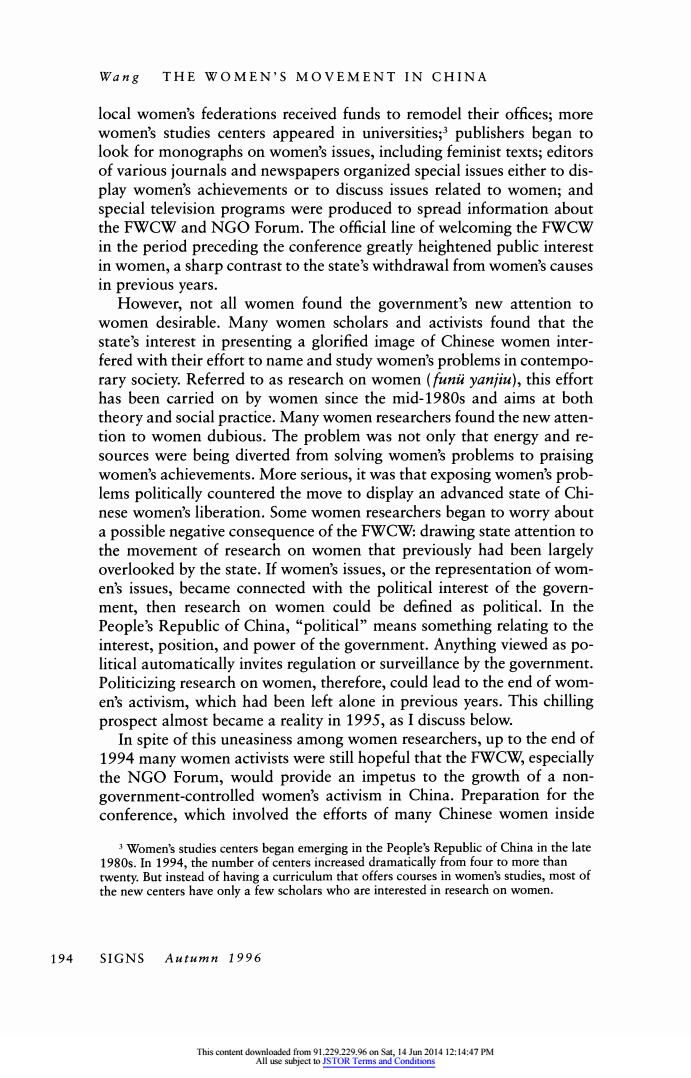正在加载图片...

Wang THE WOMEN'S MOVEMENT IN CHINA local women's federations received funds to remodel their offices;more women's studies centers appeared in universities;3 publishers began to look for monographs on women's issues,including feminist texts;editors of various journals and newspapers organized special issues either to dis- play women's achievements or to discuss issues related to women;and special television programs were produced to spread information about the FWCW and NGO Forum.The official line of welcoming the FWCW in the period preceding the conference greatly heightened public interest in women,a sharp contrast to the state's withdrawal from women's causes in previous years. However,not all women found the government's new attention to women desirable.Many women scholars and activists found that the state's interest in presenting a glorified image of Chinese women inter- fered with their effort to name and study women's problems in contempo- rary society.Referred to as research on women funii yanjiu),this effort has been carried on by women since the mid-1980s and aims at both theory and social practice.Many women researchers found the new atten- tion to women dubious.The problem was not only that energy and re- sources were being diverted from solving women's problems to praising women's achievements.More serious,it was that exposing women's prob- lems politically countered the move to display an advanced state of Chi- nese women's liberation.Some women researchers began to worry about a possible negative consequence of the FWCW:drawing state attention to the movement of research on women that previously had been largely overlooked by the state.If women's issues,or the representation of wom- en's issues,became connected with the political interest of the govern- ment,then research on women could be defined as political.In the People's Republic of China,"political"means something relating to the interest,position,and power of the government.Anything viewed as po- litical automatically invites regulation or surveillance by the government. Politicizing research on women,therefore,could lead to the end of wom- en's activism,which had been left alone in previous years.This chilling prospect almost became a reality in 1995,as I discuss below. In spite of this uneasiness among women researchers,up to the end of 1994 many women activists were still hopeful that the FWCW,especially the NGO Forum,would provide an impetus to the growth of a non- government-controlled women's activism in China.Preparation for the conference,which involved the efforts of many Chinese women inside 3 Women's studies centers began emerging in the People's Republic of China in the late 1980s.In 1994,the number of centers increased dramatically from four to more than twenty.But instead of having a curriculum that offers courses in women's studies,most of the new centers have only a few scholars who are interested in research on women. 194 SIGNS Autumn 1996 This content downloaded from 91.229.229.96 on Sat,14 Jun 2014 12:14:47 PM All use subject to JSTOR Terms and ConditionsWang THE WOMEN'S MOVEMENT IN CHINA local women's federations received funds to remodel their offices; more women's studies centers appeared in universities;3 publishers began to look for monographs on women's issues, including feminist texts; editors of various journals and newspapers organized special issues either to display women's achievements or to discuss issues related to women; and special television programs were produced to spread information about the FWCW and NGO Forum. The officialine of welcoming the FWCW in the period preceding the conference greatly heightened public interest in women, a sharp contrast to the state's withdrawal from women's causes in previous years. However, not all women found the government's new attention to women desirable. Many women scholars and activists found that the state's interest in presenting a glorified image of Chinese women interfered with their efforto name and study women's problems in contemporary society. Referred to as research on women (funii yanjiu), this effort has been carried on by women since the mid-1980s and aims at both theory and social practice. Many women researchers found the new attention to women dubious. The problem was not only that energy and resources were being diverted from solving women's problems to praising women's achievements. More serious, it was that exposing women's problems politically countered the move to display an advanced state of Chinese women's liberation. Some women researchers began to worry about a possible negative consequence of the FWCW: drawing state attention to the movement of research on women that previously had been largely overlooked by the state. If women's issues, or the representation of women's issues, became connected with the political interest of the government, then research on women could be defined as political. In the People's Republic of China, "political" means something relating to the interest, position, and power of the government. Anything viewed as political automatically invites regulation or surveillance by the government. Politicizing research on women, therefore, could lead to the end of women's activism, which had been left alone in previous years. This chilling prospect almost became a reality in 1995, as I discuss below. In spite of this uneasiness among women researchers, up to the end of 1994 many women activists were still hopeful that the FWCW, especially the NGO Forum, would provide an impetus to the growth of a nongovernment-controlled women's activism in China. Preparation for the conference, which involved the efforts of many Chinese women inside 3 Women's studies centers began emerging in the People's Republic of China in the late 1980s. In 1994, the number of centers increased dramatically from four to more than twenty. But instead of having a curriculum that offers courses in women's studies, most of the new centers have only a few scholars who are interested in research on women. 194 SIGNS Autumn 1996 This content downloaded from 91.229.229.96 on Sat, 14 Jun 2014 12:14:47 PM All use subject to JSTOR Terms and Conditions